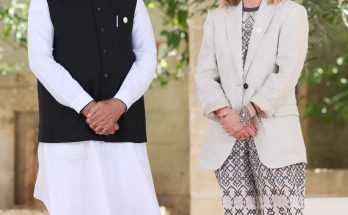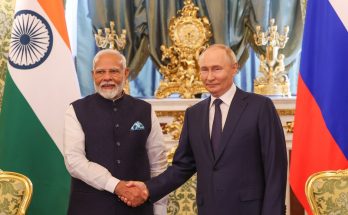
The spectre of coronavirus is haunting the world, unleashing a macabre dance of death of destruction across hemispheres. Over 200,000 people have died and more than 3 million infected with the killer virus in countries around the world. The death toll is getting updated virtually 24×7, with no light at the end of the tunnel yet.
In such an apocalyptic moment, what role can diplomacy play? With nationalistic sentiments getting revived, will the pandemic lead to erection of new barriers and prejudices? Or, is it a call for a new kind of globalisation and multilateralism? These are overwhelming questions the world is currently grappling with, as each country in its own way tries to curb the pandemic. But at the same time, it’s clear to everyone that the crisis of this scale and magnitude necessitates enhanced international cooperation and solidarity. The new strain of coronavirus is borderless and is brutally egalitarian as it has struck both rich and poor countries with a vengeance, albeit with varying degree of intensity. In this Special Edition of India and World magazine, we encapsulate and chronicle some signature diplomatic initiatives by multilateral groupings such as SAARC and G20 where India played an important role in mobilising global cooperation to combat the pandemic. This edition also comprises an insightful article by Prof. Srikanth Kondapalli on India-China cooperation in the wake of COVID-19.
Clearly, the world will never be the same even after the pandemic abates. But we should not allow the lethal virus to edge out all other issues from the global mindscape and strategic discourse.
India’s Trump Moment

Days before the pandemic struck, India hosted the largest ever public reception for a foreign leader as India and the US elevated their multi-faceted ties to the level of comprehensive global strategic partnership. India is no stranger to ‘tamasha,” but even by Indian standards, the ‘Trump Tamasha’ was unsurpassed in its sheer scale, dazzle and extravagance.
The maiden visit of President Trump to India scored high on pageantry as he was accorded a spectacular welcome at the world’s largest cricket stadium, but it was also ambitious in outcomes and fleshing out contours of a tighter strategic connect between the world’s oldest and largest democracies. Diplomacy acquired a strong personal flavour reflecting personalities of the two leaders as they lavished admiration and affection on each other, making personal chemistry central to the emerging new phase in the India-US relationship.
The success of the visit lay in the adroit manner in which it moved the relationship beyond differences about a long-negotiated trade deal to a deeper strategic convergence and a shared global vision that is reflected in the new nomenclature: Comprehensive Global Strategic Partnership. On balance, Trump’s 36-hour visit had both transactional and strategic aspects. On the transactional side, the signing of defence deals worth $3 billion and India’s plan to buy more energy from the US foregrounded the two areas that will loom prominently in the India-US partnership in years to come. On the strategic side, the big takeaway is the US’ robust endorsement of India as a net security provider in the region and a recognition of India as a major player in the Indo-Pacific region. “A close partnership between India and the United States is central to a free, open, inclusive, peaceful and prosperous Indo-Pacific region,” said the joint statement.
What made President Trump’s visit to India unique was that despite no big-ticket outcome, it has been widely hailed as a success. “In a maturing relationship, all high-level visits cannot always produce dramatic outcomes. Such an approach would be transactional, an approach we and others happen to decry in Trump! Looking ahead, the February 24-25 visit of President Trump to India transcended such transactional calculations by deepening trust and friendship between the two strategic partners,” writes Kanwal Sibal, a former foreign secretary of India, in the special edition of India and World magazine. In a similar vein, Dr Mukesh Aghi, the president of US-India Strategic Partnership Forum (USISPF), the substance of Trump’s visit lay in the big-picture messaging about the importance of the India-US partnership and reinforcing Trump’s assessment that a militarily stronger India is good for the region and the world.
Shaping India’s Rise

It may sound a bit self-congratulatory, but we can justifiably take pride in highlighting multiple perspectives on India’s ongoing rise as a global power and the kind of diplomacy that is needed to spur the rise of a new economically empowered India, with its unique voice and perspective on international affairs. The special feature on “Diplomacy for a New India,” showcases influential viewpoints from India as well as from the resident diplomatic corps. In a speech on the India-Africa partnership, Foreign Secretary Harsh Vardhan Shringla underlined that India’s partnership with Africa is beyond strategic concerns and economic benefits. “It is based on the emotional bonds we share and the solidarity we feel,” he said. In a big-picture view on “India’s Development Diplomacy,” T.S. Tirumurti, Secretary (Economic Relations) in Ministry of External Affairs, underscored the organic linkage between India’s development and the world. “Just as India’s development is good for the world as a factor for peace, prosperity and stability, we believe that the development of other countries, including our neighbours, is also good for us. This is clearly visible in our choices and actions as we pursue cooperation with our partners,” he said.
Corona Diplomacy
IW-manish-editorialThis spirit of sharing and solidarity has animated Prime Minister Narendra Modi’s approach towards mobilizing international cooperation to defeat the scourge of the coronavirus. PM Modi was the first world leader to convene a virtual leaders’ summit as he rallied the South Asia region together to jointly combat the coronavirus pandemic by announcing $10 million COVID-19 Emergency Fund for the eight-nation SAARC.
This fund has been operationalized, with many leaders of neighboring countries availing of assistance under this fund. PM Modi also took the initiative to propose the G20 virtual summit to the Saudi chair of the 20-nation grouping. At the virtual G20 conference, the Indian leader called for a new kind of humane globalization and closer coordination among the world’s major economies to mitigate the financial crisis triggered by the pandemic.
In the weeks and months to come, as a new world order emerges from the ravages of the coronavirus disease, PM Modi’s call for placing the human being at the centre of globalization should find an increasing resonance and shape the collective response to the borderless pandemic.
(This is the Editorial by Manish Chand, CEO & Editor-in-Chief, India and World magazine and India Writes Network, published in the latest Edition of IW)
(SUPPORT US/SUBSCRIBE: Write to editor@indiawrites.org, indiaandworld@hotmail.com)
Author Profile

- Manish Chand is Founder-CEO and Editor-in-Chief of India Writes Network (www.indiawrites.org) and India and World, a pioneering magazine focused on international affairs. He is CEO/Director of TGII Media Private Limited, an India-based media, publishing, research and consultancy company.
Latest entries
 India and the WorldJuly 9, 2024Defying West, India sets $100 billion trade target with Russia
India and the WorldJuly 9, 2024Defying West, India sets $100 billion trade target with Russia India and the WorldJuly 5, 2024India at SCO: Takes swipe at Pakistan for cross-border terror, pushes alternative to BRI
India and the WorldJuly 5, 2024India at SCO: Takes swipe at Pakistan for cross-border terror, pushes alternative to BRI India and the WorldJune 14, 2024Modi’s Day 1 in Italy: Bonding with Britain, France
India and the WorldJune 14, 2024Modi’s Day 1 in Italy: Bonding with Britain, France India and the WorldJune 13, 2024G7 summit in Italy: Modi to showcase India as leader of Global South
India and the WorldJune 13, 2024G7 summit in Italy: Modi to showcase India as leader of Global South






